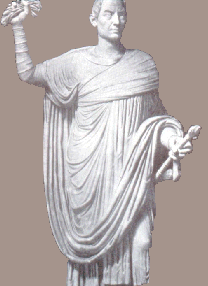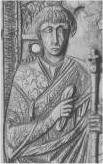Mappa

The word mappa is said to be of Carthaginian origin, and denoted a smaller kind of napkin which the guests carried with them to the table. The napkin itself was a Roman invention: since they ate mostly with their hands, frequent hand washings and wipings were in order between courses. One brought his own napkin with him which could also be used as a doggie bag to take home leftovers. These could be quite rich since meals where very big and elaborate. Often the host would actually provide a treat specifically meant to be taken away in the mappa. These meals and feasts were mainly given by the wealthier and more influential Romans and later on they carried the mappa in their hand as an ornament and as a symbol of their wealth and influence. The mappa was also used by the emperor or magistrate as a starting signal at the Circus, the emperor or consul would drop his mappa and when it hit the ground the races or games would start. In late Roman iconography it came to be a used as one of the principal attributes of the consuls (one of them was usually the emperor).
